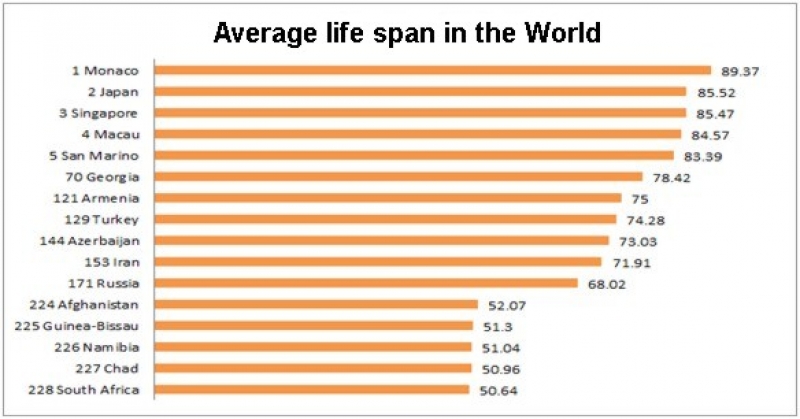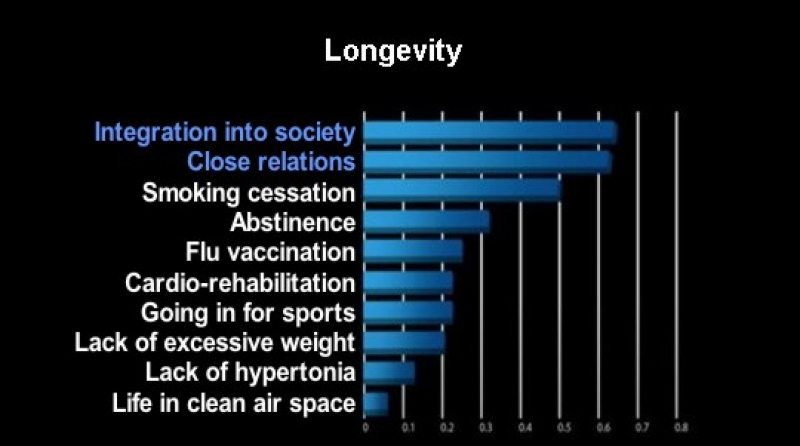
sezerozger
Average life span in Azerbaijan …
Difficult and expensive access to the first medical aid in Azerbaijan is our bitter reality. Coupled with faulty nutrition, poverty, ever growing immersion of socium into psychothic state due to unfair distribution of national income..., all these reprimand humans one after another …
It has to be kept in mind that inexorable falling of life expectancy in our country has essentially been explained as being due to factors cited above. As a former Soviet Republic, Azerbaijan has long been reputed to be a country of longlivers. This largely applies to the southern region of Azerbaijan – Talysh Mountains with their highest longevity indices. However, as distinct from previous years, no rise in the number of longlivers is observed in the country today. Thus, at present there are hardly 1000 with their hundreds – just 838 longlivers. To compare: there are 50, 000 in their hundreds now in Japan.
Worldwide rating of average life span
In the period known as Azerbaijan – country of longlivers, average life span in the developed countries (Japan and Scvandinavian countries) was lower than in our country. However, to judge by global life time index, the situastion changed for the better. Thus, if in 1950 average life span worldwide made up 48, figure rose by 1,5 times in 2017 to make up 72 which is due to the development level of many countries. Of interest is the fact that there are countries where this limit has been exceeded, and leading among them are Monaco, Japan and Singapore.

It should be remembered that an average life span in South Caucasus is as follows:in Georgia – 78 years (70th in the ratings table); in Armenia – 75 years; in Azerbaijan – 73 years (144th). Figures above testify to the fact that we failed to transform resourse economy advantages into life expectancy.
What to begin with ...
One should recal that since the 1990s the United Nations Organization has been publishing a report on the Human Development Index (HDI). Among three HDI indices there is expected average life span. When visiting the United States, I paid attention to an opinion of the head of Congress budget department who responding a question of an economist from our delegation, said that average life span in any country was largely measured by volume of funds designed for public health and allocated from the budget and private financial sources.
What is important to note is that the Ubnited States is engaged in investing heavily into publice health financing with a special emphasis on the importance of research in the area. To all appearance, basic advantages of the US economy are directly connected with service industries’ capacity. Thus, public health, education, housing and communal services and pensioners are mostly provided with consumer services at the expence of the middle class.
As far back as 15 years ago the US investments in the public health made up 14% of GDP. In the reviewed period a ratio of education expenditures made up 2,25%. Nowadays this policy tends to intensify, social oriented budget expenditures remasin to be dominating. Note that factor is likely to increase expected life expectancy in the country.
Along with direct relation between average life span and effective social-economic policy of states, there is such an important factor as individual approach to humans. Coupled with numerous governmental measures, there are factors to enhance the quality of life, including personal behavior, range of interests and care for individual health. The tendencies quoted above may be classified as follows:

The criteria mentioned above bring back into memory a piece of poetry as follows: «He who did not live 100 years, has only himself to blame...». To remove scruples, we say that we’ve done our utmost, and the rest is not in our authority.
People cannot wilfully enhance the quality of life. A factor, to the fullest extent possible contributing to the enhancement of the quality of life is mechanisms to enhance this quality and improve state’s attitude to human concerns.
The last centuries went to show that peoples-longlivers came fell on countries where the state cared for them most. And instead, average life span reduced in places where the state pursued solely its mercantile interests.
This notwithstanding, a considerable progress has been reached on this track worldwide. Over the past two centuries, average life span has essentially risen. To compare: in 1840s human lived not more than 40 years on the average.
In the Victorian epoch (1837-1901) there followed improvement of nutrition, hygiene, housing, etc. that led to the prolongation of average life span to 60 years. Note that life expectancy rose to 80 years for women and to 75 years for men over the past 50 years, especially as a result of reforms in public health system.
Why is average life span in Azerbaijan with its plans to transform oil wealth into human wealth falling? In my view, the reason lies not in oil or human proper but in inability to strike the right balanse in the development of human and oil resources.













Leave a review